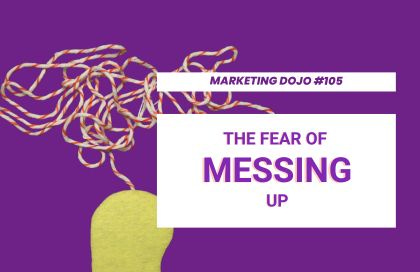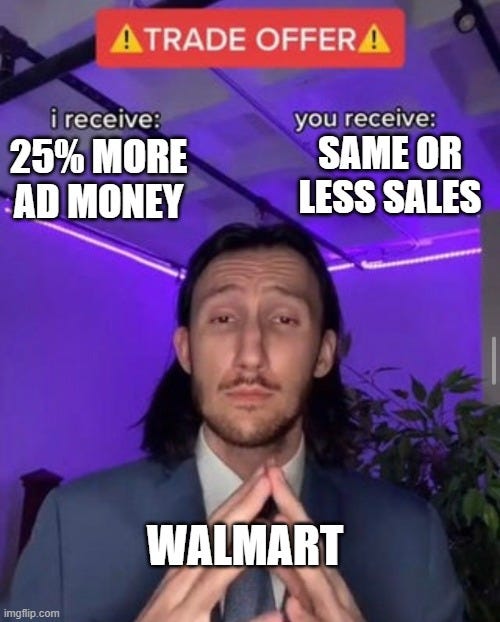MarketingDojo#105: 🤔 81% of marketers chose this over FOMO 📊
FOMO is out, Obsess over chocolates, Retail's pay to play and more.
Don’t panic.
Last week, I joined countless others watching my hard-earned savings take a wild ride on the US stock market rollercoaster. 🎢
In search of comfort, I turned to one of my all-time favorite books: The Hitchhiker’s Guide to the Galaxy. It reminded me of two important things:
Don’t panic.
Always carry a towel.
No matter how many times I’ve read it, the jokes still land. I know what’s coming, and I still laugh out loud.
Now, this week’s newsletter may not be quite as unhinged as Douglas Adams’ universe, but if you’re hoping for a quick break from the daily grind, here’s what you’ll find inside:
😨 Marketers fear messing up
🍫 KitKat’s creative twist
🛒 Retail’s new toll gate
📹 YouTube’s smart play
And lots more.
Another thing I recommend—besides carrying a towel—is subscribing to Marketing Dojo.
There’s never a dull week in the world of marketing, and this curated newsletter will help you keep up (without losing your mind in the process).
Seatbelts > Rockets
I had a wake-up call recently while moderating a panel at the Martech Summit.
We posed what seemed like a simple question to the audience: "While buying marketing technology, do you experience more fear of messing up (FOMU) or fear of missing out (FOMO)?"
The answer shocked me. 81% of the 200+ marketers chose fear of messing up over fear of missing out.
Put this in context: These professionals were less concerned about competitors leaving them in the dust with new technology and more worried about choosing a solution that fails, potentially damaging their reputation or even costing them their job.
This reveals a massive disconnect in how we approach B2B marketing.
The dissonance between how we market (innovation, disruption, transformation) and how buyers evaluate purchases (safety, reliability, proven results) creates a fundamental messaging gap.
Here are 3 ways to respond:
Proof over promise. Real case studies > aspirational language.
Safety over sizzle. Make your brand the low-risk, safe choice — think Salesforce, not "stealth mode."
Give them an out. Free trials, pilot phases, and money-back terms help reduce fear of failure.
We're not just in the era of innovation. We're in the era of justification.
Have you experienced the rise of Fear Of Messing Up?
Creative Excellence: Petition to replace phones with KitKat.
Look around you right now. Spot anyone not staring at their phone? Yeah, me neither.
VML Czechia just gave KitKat's classic "Have a break" message a modern twist—and nailed it.
The campaign, aptly named "Phone Break," cleverly extends KitKat's iconic "Have a Break" message for today's screen-dominated world. At its heart are visuals showing people looking down—but instead of at smartphones, they're fixated on KitKat bars.
Best advertising combines a universal truth with a brand's authentic voice—and reminds us that the best breaks might happen when we look up from our screens.
It's funny. It's fresh. And it's very, very KitKat.
Meme-Time: The New "Pay-to-Stay" Economy.
Retail media used to be a growth hack. Now, it's becoming a tax.
Walmart is asking its brand partners to increase their retail media ad spending by 25% year-over-year. And it's not a suggestion—it comes with consequences.
For those who haven't been following this evolving drama, retail media refers to advertising within a retailer's ecosystem—whether on their website, app or in physical stores. It leverages the retailer's first-party customer data to target shoppers at crucial decision-making moments.
The numbers tell an interesting story: While Walmart's overall sales growth has cooled to a projected 3-4% annually, its advertising revenue surged by a whopping 27% year-over-year in 2024. Wall Street loves it.
But many brands don't.
Despite increased spend, some brands report flat or falling sales. The advertisers are paying more, but not always getting more.
The situation places brands in an impossible position:
Comply with the 25% increase and accept potentially diminishing returns. Since budgets remain stagnant, it also means taking away money from other channels.
Reduce ad spending and risk losing visibility on the platform.
Walk away entirely and surrender market share to competitors who are willing to pay
Walmart's aggressive 25% growth mandate signals that we've entered a new phase of retail media—one where the relationship between spending and results has become increasingly tenuous. Still, the consequences of not participating are all too real.
The million-dollar question for marketing leaders: Where is the breaking point? At what stage does retail media cease to be an investment and become simply a cost of access?
YouTube Hitchhikes into Social Commerce.
Build, buy, or partner: Each platform is choosing its lane to grab the social commerce opportunity.
TikTok built its shop and hit gold.
Amazon tried to build one and hit a wall.
Now, Amazon is trying to buy TikTok's US business like it's Black Friday.
But YouTube? It's taking the partnership route.
After a successful pilot in Indonesia, YouTube is expanding its partnership with e-commerce giant Shopee across Southeast Asia—rolling out in Thailand, Vietnam, and Singapore.
Here's how it works:
Creators can tag Shopee products in videos, Shorts, and livestreams on YouTube
Viewers can shop directly from the video
Creators get affiliate commissions
Over 250,000 creators joined the pilot.
Shopee, which owns nearly half the Southeast Asia e-commerce market, gives YouTube serious reach—without building a store from scratch.
What YouTube has crafted is a risk-mitigated entry into social commerce. No inventory headaches. No fulfilment nightmares. No marketplace regulations to navigate. Just a clean revenue share on transactions they facilitate.
It's a low-risk, high-reward entry into social commerce. And it's working.
Short Stuff:
Outlook will begin routing emails from high-volume senders who fail to meet authentication standards to the Junk folder (Following Google & Yahoo’s footsteps).
Meta faces a landmark antitrust trial that seeks to force the company to divest Instagram and WhatsApp (Which is unlikely to go through but interesting to watch).
The Trade Desk faces lawsuits alleging it secretly violates consumer privacy laws by collecting and sharing personal data without consent. (Not surprised, just disappointed).
That’s a wrap on this week. Thank you for your time and attention. If you made it this far and enjoyed what you read, remember to leave a like. I appreciate your support.
I will see you in your inbox next Wednesday.
Regards,
G






